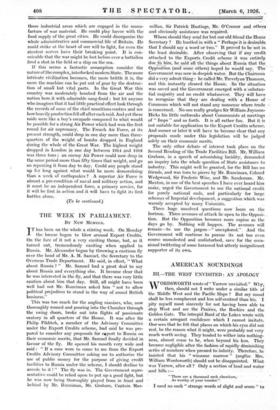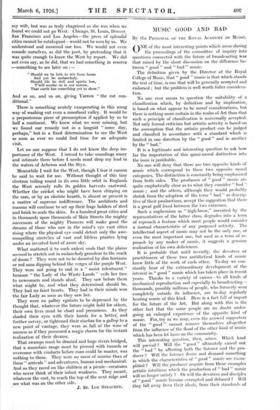l i lliTORDSWORTH wrote of" Yarrow unvisited." Why, Vthen, should not I
write under a similar title of the Middle West and the Pacific Slope ? But my mood shall be less complacent and less self-centred than his. I .pity myself most sincerely for not having been able to step West and see the Prairies, the Rockies and the Golden Gate. The intrepid Bard of the Lakes wrote with • a certain arrogant confidence which I cannot imitate. One sees that he felt that places on which his eyes did not rest; be the reason what it might, were probably not very much worth seeing. They tended to wither into nothing- ness, almost cease to be, when beyond his ken. They became negligible after the fashion of rapidly diminishing series of numbers' when' pressed to infinity. Therefore, he insisted that his " winsome marrow " (anglice Mrs. William Wordsworth) should not be disappointed. What was Yarrow, after all-? Only a section of land -and water and hills :— " There are a thousand such elsewhere,-
• As worthy of your wonder."
I used no such " strange words of slight and scorn " to my wife, but was as truly chagrined as she was when we found we could not go West. Chicago, St. Louis, Denver, San Francisco and Los Angeles—the press of splendid cities cannot be catalogued—would not be seen by us. We understood and mourned our loss. We would not even console ourselves, as did the poet, by pretending that it was quite enough to know the West by report. We did not even say, as he did, that we had something in reserve —something to see later on :- "Should we be loth to stir from home And yet be melancholy.
Should life be dull and spirits low, T'will soothe us in our sorrow, That earth has soinething yet to show."
And so on, and so on, giving Yarrow " the cut con- ditional."
There is something acutely exasperating in this smug way of washing out even a moorland valley. It would be a preposterous piece of presumption if applied by us to half a continent. We knew what we were missing, but we found our remedy not in a languid " some day, perhaps," but in a fixed determination to see the West as soon as ever we could find time for an adequate visit.
Let no one suppose that I do not know the deep im- portance of the West. I intend to take soundings many and intimate there before I needs must drop my lead in the waters of Acheron and the Styx.
Meanwhile I wait for the West, though I fear it cannot be said to wait for me. Without thought of this tiny electron toiling round in its own little orbit in England, the West serenely rolls its golden harvests eastward. Whether the cricket who might have been chirping on the cars, or by an electric hearth, is absent or present is a matter of supreme indifference. The architects and masons will continue to set up their huge ladders of steel and brick to scale the skies. In a hundred great cities and in thousands upon thousands of Main Streets the mighty successors of the mighty Pioneers will make good the dreams of those who saw in the mind's eye vast cities rising where the physical eye could detect only the awe- compelling stretches of vast and lifeless prairies lying under an inverted bowl of azure sky.
What mattered it to such ardent souls that the plains seemed to stretch out in melancholy grandeur to the crack of doom ? They were not to be daunted by dim horizons or red suns dipping behind the verges of the purple West. They were not going to end in a " moist relentment " because " the Lady of the Waste Lands " veils her face to newcomers and stands aloof. They saw before them what might be, and what they determined should be. They had no faint hearts. They had in their minds won the fair Lady as soon as they saw her.
They were no paltry egotists to be depressed by the thought that, whatever the future might hold for others, their own lives must be short and precarious. As they shaded their eyes with their hands for a better; and further survey, or tightened their cinches for a gallop to a new point of vantage, they were as full of the wine of success as if they possessed a magic charm for the instant realization of their dreams.
That swamps must be drained and huge rivers bridged, that a mountain range must be pierced with tunnels or overcome with viaducts before man could be master, was nothing to them. They were no surer of sunrise than of these " arrivals " and adventures, human and mechanical. And so they raced on like children at a picnic—creatures who never think of their infant weakness. They meant, whatever the cost, to reach the top of the next ridge and see what was on the other side.
J. ST. LOE STRACIIEY.







































































 Previous page
Previous page